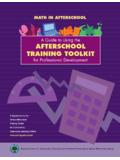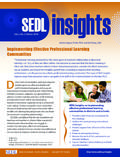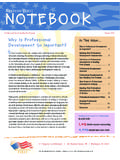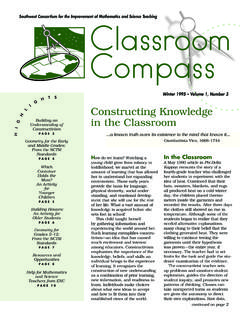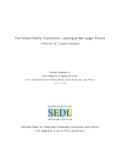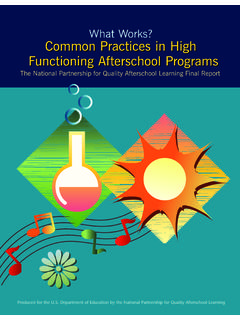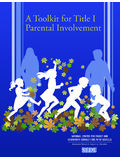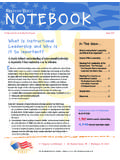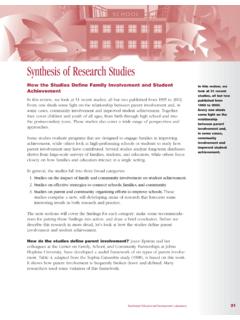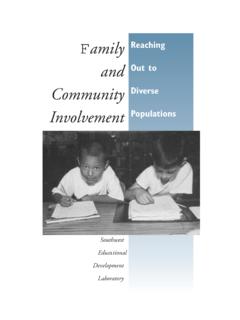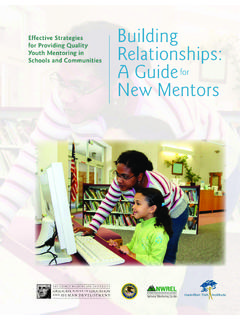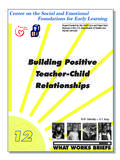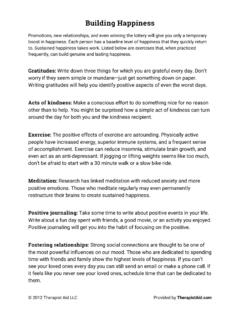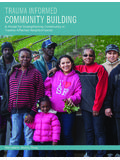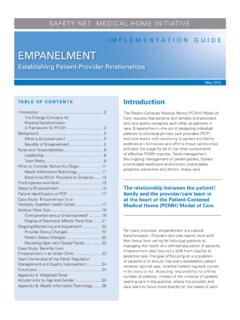Transcription of Building and Managing QUALITY - SEDL
1 AFTERSCHOOLB uilding and ManagingQUALITYPROGRAMSA Practitioner s GuideThis publication funded by Mott Foundation2 Copyright 2009 SEDLSEDL4700 Mueller Blvd. Austin, TX 78723 Voice: 512-476-6861 or 800-476-6861 Fax: citation in APA format:Jordan, C., Parker, J., Donnelly, D., Rudo, Z. (Eds.). (2009). A practitioner s guide : Building and Managing QUALITY afterschool programs. Austin, TX: Research TeamThe National Partnership research was led by the National Center for Research on Evaluation, Standards, and Student Testing (CRESST) in Los Angeles, California, in collaboration with SEDL. Joan Herman, Co-director of CRESSTD enise Huang, Senior ResearcherPete Goldschmidt, Database ManagerSteering CommitteeMarilyn Jager Adams, Brown UniversityGrace Davila Coates, FAMILY MATH EQUALS, University of Southern California, BerkeleyAn-Me Chung (Ex-Officio), Charles Stewart Mott FoundationHarris M.
2 Cooper, Duke UniversityPat Edwards, ConsultantStephanie Hirsh, National Staff Development CouncilRhonda Lauer, Foundations, Little, Harvard Family Research ProjectCarol K. McElvain, Learning Point AssociatesClaudette Morton, Montana Small Schools AllianceElizabeth Reisner, Policy Studies Association, Weiss, Harvard Family Research ProjectJack Edmo, Bureau of Indian EducationDiane Willis, South Carolina State Department of EducationHaydee Perez, New Jersey State Department of EducationContent Experts and AdvisorsLiteracy Content Developers for Education Northwest, Portland, OregonBrenda BritschRandi DouglasNicole MartinEve McDermottGwen McNeirLiteracy Content Advisors and ConsultantsMarilyn Adams, Brown UniversityMarie Mancuso, WestEdScott Paris, University of MichiganMath Content Developers for McREL, Denver.
3 ColoradoChris Briggs-HaleMaggie CooperJodi HolzmanJohn LoughranHeather MartindillDanette ParsleyMath Content Advisors and ConsultantsNoemi Lopez, Harris County Department of EducationMargaret Myers, University of TexasGrace Coates, University of California at BerkeleyScience Content Developers for SERVE Center, Greensboro, North CarolinaPatricia McClureErrin McCombMichael ViglianoScience Content Advisors and ConsultantsKaren Falkenberg, Emory UniversityMarilyn Fowler, University of Texas at AustinAminata Umoja, Atlanta Systemic InitiativeKimi Hosoume, Lawrence Hall of Science, University of California at BerkeleyArts Content Developers for SEDL, Austin, Texas Suzanne StiegelbauerJennifer BransomTonyamas MooreLaura OrangeGregg A. JohnsonBrent HastyArts Content Advisors and ConsultantsGigi Antoni, Big Thought A Learning PartnershipDennie Palmer Wolf, Annenberg Institute, Brown UniversityTechnology Content Developer for SEDL, Austin, TexasMarilyn HeathTechnology Content Advisors and ConsultantsKathy Dick, ConsultantMindy DiSalvo, DeKalb County School SystemTony Streit, Education Development CenterHomework Content Developers for SERVE Center, Greensboro, North CarolinaErrin McCombTina JohnsonKimberly Scriven-BerryPatricia McClureHomework Content Advisors and ConsultantsHarris Cooper, Duke UniversityDavid Malone, Duke UniversityMedia Developers for WGBH, Boston, MassachusettsAmy TonkonogyArthur SmithCynthia A.
4 McKeonnMelanie MacFarlanA C K N O W L E D G M E N T SWe wish to acknowledge the contributions of the members of the National Partnership for QUALITY Afterschool Learning, 2003 by:Catherine JordanJoe ParkerDeborah DonnellyZena Rudo AFTERSCHOOLB uilding and ManagingQUALITYPROGRAMSA Practitioner s GuideFunded by Mott FoundationSEDL | National Center for QUALITY AfterschoolA Practitioner s guide : Building and Managing QUALITY Afterschool Programs1As an afterschool leader, you know all too well the many challenges involved in Managing , organizing, and operating a high QUALITY program. Providing fun and engaging activities for students that boost their academic performance and motivate them to keep attending your program is definitely a primary focus.
5 But so is knowing how to effectively oversee daily operations, support your staff, and sustain strong relationships with stakeholders. Often it s hard to find the resources and practices you need and can rely on to implement your goals. This guide is designed to share with you the practices that can help you cover it all great programming, terrific staff, positive relationships, and plenty of resources to lead and sustain successful afterschool s Included in This GuideProduced with the generous support of the Mott Foundation, this guide is intended to share the insights of SEDL s National Partnership for QUALITY Afterschool Learning (the National Partnership) as well as information about both the academic and the organizational and management practices that successful afterschool programs use.
6 We have organized these practices into the following four focus areas: program organization academic programming practices supportive relationships in afterschool achieving program outcomes Within each focus area, we describe the key practices of successful programs. In addition, we provide a QUALITY -O-Meter tool to help you reflect on your practices. This tool incorporates what the National Partnership learned in its research as well as knowledge from its numerous content experts. We then provide a Planning for Action tool to help you document plans for implementing practices to increase your program s QUALITY . This tool is a structured way to organize and manage the implementation of any new or enhanced afterschool | National Center for QUALITY AfterschoolA Practitioner s guide : Building and Managing QUALITY Afterschool Programs2 How Practitioners Can Use This GuideAnyone associated with what is often referred to as expanded learning time whether afterschool, before school, Saturday, extended day, extended year, summer learning, or any other nontypical school-day learning situation will find this publication useful.
7 In particular, this guide can help build the knowledge and skills of a variety of audiences. With individuals, leaders can use this guide as a self-study of the key practices that contribute to a successful program. With groups, leaders can use it to guide discussions and decision-making processes in a professional learning community. This guide can serve as a continuous improvement and planning tool for staff or a program advisory group. Furthermore, it can be used to inform the ongoing discussions between school-day programs and afterschool or other expanded learning | National Center for QUALITY AfterschoolA Practitioner s guide : Building and Managing QUALITY Afterschool Programs3 The Research Base for This GuideThis guide is based on a 5-year research study funded by the Department of Education and conducted by the National Partnership, a collaborative of eight organizations.
8 This exploratory study examined high QUALITY afterschool programs having evidence suggesting a strong connection to increased student academic achievement sustained over several years. The study had three major goals: To identify practices the programs were using successfully to increase student performance in the six content areas of literacy, mathematics, science, the arts, technology, and homework/tutoring assistance To explore trends in the practices across the programs in the study To share the practices observed across the sites with the larger afterschool communityTo select sites for the study, National Partnership staff reviewed annual performance reports and a variety of other data for 21st Century Community Learning Center grant recipients and other successful afterschool programs.
9 On the basis of data from these sources, 53 programs in 33 states were identified as providing QUALITY afterschool practices. National Partnership staff and program leaders worked together to select from each program two sites that had been in operation for at least 3 years, were focusing on the content areas, and had evidence of success in promoting student learning. A total of 104 individual sites were chosen for the study. For a more detailed description of the site selection methodology, see the Appendix; and for the full research report, go to The National Partnership then sent teams trained in the study protocols to spend time at each site. Using the National Partnership protocols, the teams collected survey information from parents, school-day staff, and afterschool staff; conducted scripted interviews with a variety of staff; and made organized observations of activities focused on one of the study s six study areas.
10 The teams also Four Focus Areas for High QUALITY Afterschool Programming1. Program Program Leadership ..6 Program Governance ..10 Program Structure ..13 Staff Characteristics ..17 Student Behavior ..202. Academic Programming Practices ..23 Goal-Oriented Programs ..24 Standards-Based Learning Activities ..27 Research-Based Curriculum and Instructional Practices ..313. Supportive Relationships in Afterschool ..35 Linking to the School Professional Development ..40 Building and Maintaining Relationships ..44 Peer Collaboration and Cooperative Learning ..48 Family Engagement ..51 Community Connections ..554. Achieving Program Outcomes ..59 Accountability ..60 Internal Evaluations ..61 External Evaluations ..62 Evaluation Challenges.
